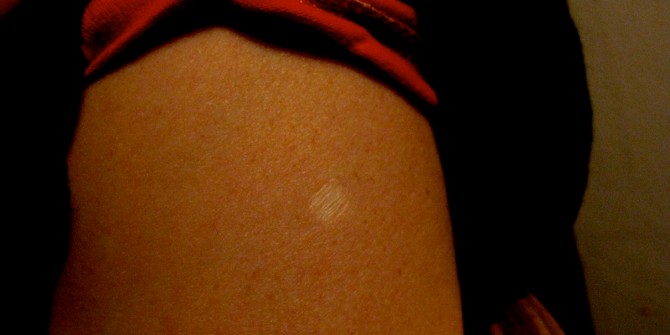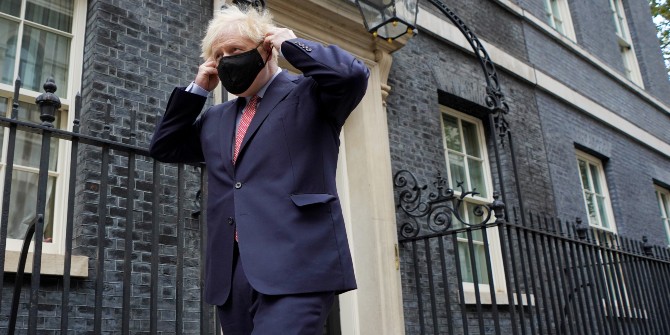Would it be right for publicly-funded universities to profit from their role in creating a COVID-19 vaccine? Luke McDonagh (LSE) looks at the case of the Oxford University/AstraZeneca collaboration, noting that its plans to offer non-exclusive, royalty-free licences only apply until the WHO declares the pandemic over.
If we want to ensure universal global access to any COVID-19 vaccine, we must find the right balance between the important work being done by publicly-funded universities and private enterprises (such as pharmaceutical companies), as well as the role for state-granted property rights for newly invented medicines (patents).

The brave activists who led the campaign for affordable HIV medicines in South Africa in the late 1990s highlighted a fact that at the time was largely hidden in the West: maintaining public health often conflicts with the interests of private, patent-owning companies. As drug prices have risen in the past few decades, the issue of access to medicines has belatedly become a major concern in the UK and US. In 2018 NHS England struggled to obtain the life-enhancing cystic-fibrosis drug Orkambi for more than a year, with Vertex initially rejecting the largest offer in NHS history (£100m per annum) until a deal was eventually made last year. The Financial Times recently reported that ‘Big Pharma’ views the crisis as a ‘shot at redemption’ and ‘investors believe the crisis will ease the political scrutiny’ that has hung over the industry in the wake of price scandals and the opioid epidemic, which has been linked to the OxyContin patents owned by the Sackler family and manufactured by Purdue.
COVID-19 has made concerns over access to medicines truly universal. It has also led to a greater focus on the essential role of universities in developing vaccines and treatments. It is important to consider the effect of UK universities’ links with the private sector. My main focus is the relationship between Oxford University and AstraZeneca and the promising COVID-19 vaccine ChAdOx1 nCoV-19 developed at Oxford. (At the time of writing it is on hold after one of the participants had an adverse reaction.)
How intellectual property apples to public institutions working in the private sphere
The public role that universities play within society is indisputable, and most UK universities are publicly-funded institutions. Yet through their university intellectual property (IP) policies and technology transfer models, they are also actors in the private sphere. Universities commonly apply for patents on their research outcomes and then ‘spin out’ and license these new technologies and medicines. The overall annual total for UK universities’ IP revenues amounts to more than £150 million. Yet success has been uneven, with a relatively small number of large research-intensive universities achieving lucrative outcomes, while the majority of institutions focus on more modest efforts. For example, the figures for 2017–18 show a wide variance, with Oxford University (£53m) by far the most successful, followed by the upper tier of Queen’s University Belfast (£22.1m), University College London (£14.7m), University of Sheffield (£12.7m), and the University of Cambridge (£8.1m), and several other high profile institutions showing revenues towards the lower end, e.g. Imperial College London (£3.5m) King’s College London (£2.8m), University of Edinburgh (£2.39m), Newcastle University (£1.76m), City, University of London (£397,000).
When public universities create research that is potentially of commercial value, tensions between public goods and private interests inevitably occur. Yet it is logical that innovative research on COVID-19 should benefit the public first and foremost. When considering how best this can be achieved, it is imperative to examine the appropriate role for intellectual property (IP) rights, such as patents (since patenting is the primary method of protection for scientific inventions). How can we ensure that university research benefits the public (including the global public)? Can the exclusive rights and licence agreements envisaged by the patent system achieve overall public welfare goals, or are they ultimately a hindrance?
What the Oxford University/AstraZeneca agreement says
A potential vaccine (ChAdOx1 nCoV-19) has been developed at the UK’s most successful IP licensing institution, Oxford University. It is currently undergoing human trials in Brazil. Other universities may also end up owning valuable COVID-related IP in the form of patents, design rights and trade secrets: Imperial College London is working on a potential vaccine; while King’s College London owns an innovative prototype ventilator, OxVent, which recently progressed to the next phase of safety and usability testing. But Oxford’s vaccine currently looks the most promising, and as such the issue of access to it is worth exploring in detail.
The University of Oxford has received several million pounds worth of UK government funding for the development of this vaccine – it is very much a ‘public-facing’ project at a public institution. Yet, after apparently initially considering a completely ‘open’ licensing approach, Oxford agreed an exclusive partnership with the pharmaceutical giant AstraZeneca in April for the development and manufacturing and distribution of the vaccine. Partnering with an experienced manufacturer and distributor of medicines makes sense given the need to produce a massive amount of vaccine quickly and at scale. Yet there are concerns at how this deal could play out.
The Oxford-AstraZeneca agreement envisages exclusive rights (via patents and trade secrets) and the use of IP licensing. In this regard, Oxford University Innovation (OUI) has made public its policy for third-party access to university IP relevant to COVID-19. It has five aspects:
-
1. OU and OUI will expedite access to Oxford IP to enable global deployment at scale of associated products and services to address the COVID-19 pandemic
2. The default approach of the University and OUI regarding (1) will be to offer non-exclusive, royalty-free licences to support free of charge, at-cost or cost + limited margin supply as appropriate, and only for the duration of the pandemic, as defined by the WHO
3. Licence terms for supplying downstream (post-pandemic) commercial markets will be the subject of a separate agreement
4. The grant to a Licensee of access to IP under (1) does not guarantee it will be granted downstream commercial rights
5. Where relevant University IP is licensed to support commercial sales after the point at which the pandemic is declared by the WHO (or other appropriate body) to be over, such licences will carry appropriate financial terms to allow the University to reinvest proceeds in research and teaching.
Thus Oxford’s default approach regarding this access will be to offer non-exclusive, royalty-free licences to support free-of-charge, at-cost or cost with limited margin supply as appropriate. This sounds reasonable and could, in theory, help ensure global, universal access. However, there is a caveat: these terms will only apply for the duration of the pandemic, and OUI expects there to be a commercial market post-pandemic that would allow the university to obtain revenues. The definition of the ‘duration of the pandemic’ will be crucial – what happens if the WHO declares the global pandemic to be over, but localised outbreaks still occur in developing countries?
There is a concern that in a desire for profit, developing countries (and their populations) could be priced out in such circumstances. It can certainly be argued that it is immoral that one of the world’s wealthiest public institutions is seeking to make a financial surplus on a COVID-19 vaccine developed using public funds (even if profits are only achieved after the pandemic is declared over by the WHO).
Oxford University Innovation’s chief operating officer Adam Stoten commented in April that he did not envisage any problems of access:
“We are making sure we have good alignment with UK interests, but equitable global access will also be embedded in any licence we grant… The negative publicity attached to asserting your IP rights would be very large… It is critical for companies to do the right thing and be seen to be doing the right thing.”
This statement indicates that Oxford University understands that global access must be the priority. But the proof will be in the way access to the vaccine actually works in practice over the coming years.
Oxford can and should commit to open licensing
Oxford University researchers should be commended for their innovative vaccine research, which may yet result in a viable vaccine. OUI’s statement on ‘equitable global access’ shows there is no doubt the university is well aware of its responsibilities towards the wider world. Nonetheless, in the era of Black Lives Matter, and the debate over reparations from those institutions that benefited from funds arising from slavery and colonialism, Oxford can and should consider doing more. The university should commit to an open licensing approach for all developing country use of any vaccine, even post-pandemic. It would be morally perverse if, faced with a truly universal disease, publicly-funded universities develop medicines and partner with private companies to manufacture at scale, only to end up ensuring only the populations in rich countries actually receive access.
This post represents the views of the author and not those of the COVID-19 blog, nor LSE.






A fascinating read, Luke. It would be interesting to learn more about how Oxford University spin-off Vaccitech and former Global Head of Trading at Deutsche Bank, Andrew Crawford-Blunt fit into all this (WSJ August, 2). Looking forward to your next post!